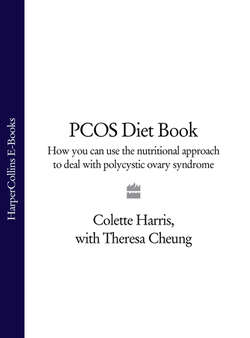Читать книгу PCOS Diet Book: How you can use the nutritional approach to deal with polycystic ovary syndrome - Theresa Cheung - Страница 10
EATING TO HELP WEIGHT CONTROL
ОглавлениеA second reason food can be a powerful tool for managing PCOS is its role in weight control. How much you weigh and the amount of body fat you have are two of the most important factors in determining how severe your symptoms of PCOS are. Repeated studies show that losing weight can result in improvements.2 Many of us with PCOS know only too well that this can be really difficult (more on that in a moment), but weight loss – if you are presently overweight – can really help.
Research shows that overweight women with PCOS have more fertility problems than lean women with PCOS.3 Overweight women with PCOS who diet and lose weight find that their testosterone levels fall and PCOS symptoms diminish. The weight loss doesn’t have to be dramatic, either. Some women lost just a few pounds, others lost much more. In both cases weight loss lead to remarkable improvements in fertility: 82 per cent of the women who were not previously ovulating ovulated, with a number of successful pregnancies, even though these women had had long-standing histories of infertility.
No one really knows why PCOS responds so well to weight loss. It may be linked with the fact that overweight women (without PCOS) can dramatically increase their fertility by losing weight.4 It may also be that weight loss lowers insulin levels, which in turn reduces the ovaries’ production of testosterone. When you gain weight, levels of insulin and testosterone increase; the hormonal chaos this creates can make symptoms of PCOS worse. It could also be because fat itself gives out more oestrogen, adding to the hormonal imbalance.
Whatever the reason, avoiding anything that can trigger weight gain, insulin resistance and an overproduction of male hormones is important in helping to manage PCOS symptoms.
In addition to a reduction in severity of symptoms, there is another reason why weight loss is a really positive step for overweight women with PCOS. If you have PCOS you are more likely than those without to have weight-management problems. Research shows that obesity is four times more likely in women who have PCOS and irregular periods than those without.5 The tendency in women with PCOS is to put on weight around the waist rather than the hips – making for an apple shape as opposed to a pear shape.6 In a recent review, PCOS expert Professor Gabor T Kovacs from Monash Medical School, Box Hill Hospital, Melbourne, Australia cites studies that confirm that ‘Women with PCOS appear to remain centrally obese when approaching the menopause.’7
Gaining weight around the middle is associated with a higher risk of poor health according to a 25-year study at Gothenburg University in Sweden. No one is really sure why being an ‘apple’ carries with it more health risks than being a pear, but it may be due to the way the body processes fat stored in different parts of the body. Fat around the tummy is constantly being broken down and circulated around the body, while fat around the bottom is not. Higher levels of circulating fat increase the risk of heart disease and narrowing of the arteries. Abdominal fat can also put pressure on internal organs such as the heart.
With insulin resistance and excess weight already putting a strain on the heart, the fat-distribution problem is another incentive for keeping to a healthy weight if you have PCOS.
So is losing weight the answer? Unfortunately it isn’t that simple.
